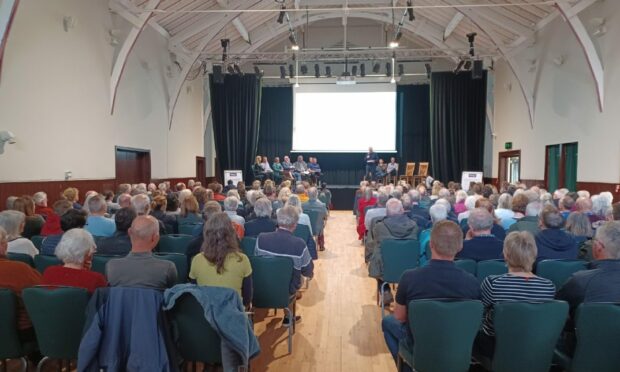Plans to upgrade the electricity network in the Highlands need to take more account of communities that could be affected, a public meeting has heard.
Around 300 people turned out to an event in Strathpeffer to discuss a controversial proposed new power line from Caithness to Beauly.
The meeting heard concerns about the impact on sensitive areas and the way of life in many locations.
Many complained at the way SSEN had handled the process and that communities were not being considered.
The power company apologised to the audience for not getting its consultation right, but said it is trying to minimise the impact on the area.
What is planned?
SSEN plans to route a new 400KV overhead line from Spittal in Caithness to Beauly and on to Peterhead.
A subsea connection from the Western Isles is also planned to connect to Beauly via underground cables and a high voltage direct current converter station.
Three new 400KV substations are earmarked for Beauly, Spittal and Loch Buidhe, in Sutherland as part of the plan.
SSEN says the project is part of a nationwide programme of network reinforcements required to deliver net zero and energy security targets.
To meet these, it aims to submit applications for the power lines by November next year.
An overhead line is the preferred option due to constraints and costs.
It is estimated putting the line entirely subsea would be four times more expensive, while undergrounding would be five times dearer.
It stresses it is exploring alternative overhead line routes and substation locations, alongside potential mitigation measures, following community feedback.
The company has also said the plans will “turbo-charge” the economy by supporting tens of thousands of jobs and delivering billions of pounds of investment.
But it has warned some visual and landscape impacts will be unavoidable.
Opposition to the proposals
Opponents say the planned line threatens historical, environmental and cultural sites.
The Strathpeffer and Contin Better Cable Group said alternative routes with less impact are possible.
Communities B4 Power Companies was set up to fight the pylon plans amid fears of the “industrialisation” of communities around Beauly.
Founder Lyndsey Ward said she wants SSEN to provide evidence of need for the transmission lines and infrastructure.
A forum of Highland community councils is also being created to unite the campaign against the pylons.
Some 24 community councils between Spittal and Beauly have been invited to join the new group, with 21 signed up.
The public meeting was arranged by Strathpeffer Community Council. Chairman Ron McAulay said it showed the strength of feeling locally.
“For a community council meeting to get 300 people out on an evening sends a pretty strong message.”
The plans have to confirm with National Grid and Ofgem regulations, but Mr McAulay said the process is disjointed.
“The electricity industry comes across as being made up of many individual parts that don’t sound as if they are speaking to each other properly.
“There is a need to tackle all these organisations to get them to start thinking common sense and communicate how they can do things a lot beter.”
He urged the audience to make their feelings known to SSEN and regulators, as well as the Scottish Goverment and Highland Council.
Support for tackling climate change
He said the government should take control of approvals and the council should lodge an objection under the process used for new transmission lines.
Mr McAulay said “99%-100%” of people at the meeting support the need to tackle climate change.
“There is a recognition we need to be using green energy and we need energy security and that means we need to reinforce the grid.
“But the argument is about how you do that. It needs to be done in a way that takes into account the views of the community and the impact on the community.
“If they adapted more of the criteria used to select the routes and included more about the impact on the community, health wellbeing etc, you might find the routes they select look very different to the ones they have at the moment.”
Alastair Rennie from Contin told the meeting SSEN had been “found wanting” at every stage of the process and that communities felt “manipulated” by big business.
John Cooper from Strathpeffer said if the proposals were accepted, more power lines could be built in future and the area affected by “incremental encroachment”.
Tor Justad,also from Strathpeffer, said in order to tackle climate change support had to be given to renewable energy.
Local MP Ian Blackford said it is important local voices are heard and their concerns understood.
“I don’t think the process has gone the way it should have done and that needs to change. But there is a willingness from SSEN to do that.”
An opportuntiy for the Highlands
He added: “There is going to be a necessary upgrade to the network. How do we do that sensitively? How do we protect communtiies ?
“This is a fantastic area to live in and it has to be protected.
“But we ought to turn all this into an opportunity. I want to see the Highlands being an area where people can enjoy the fantastic environment we live in, but there are opportunities for jobs and for this to be a thriving living place.
“Green energy is part of that solution and will be a huge part of making sure this is a place where families can live and grow in and can look forward for decades of prosperity.”
Are you interested in all the latest news and updates from Inverness? If so, why not join our new Facebook group.




Conversation